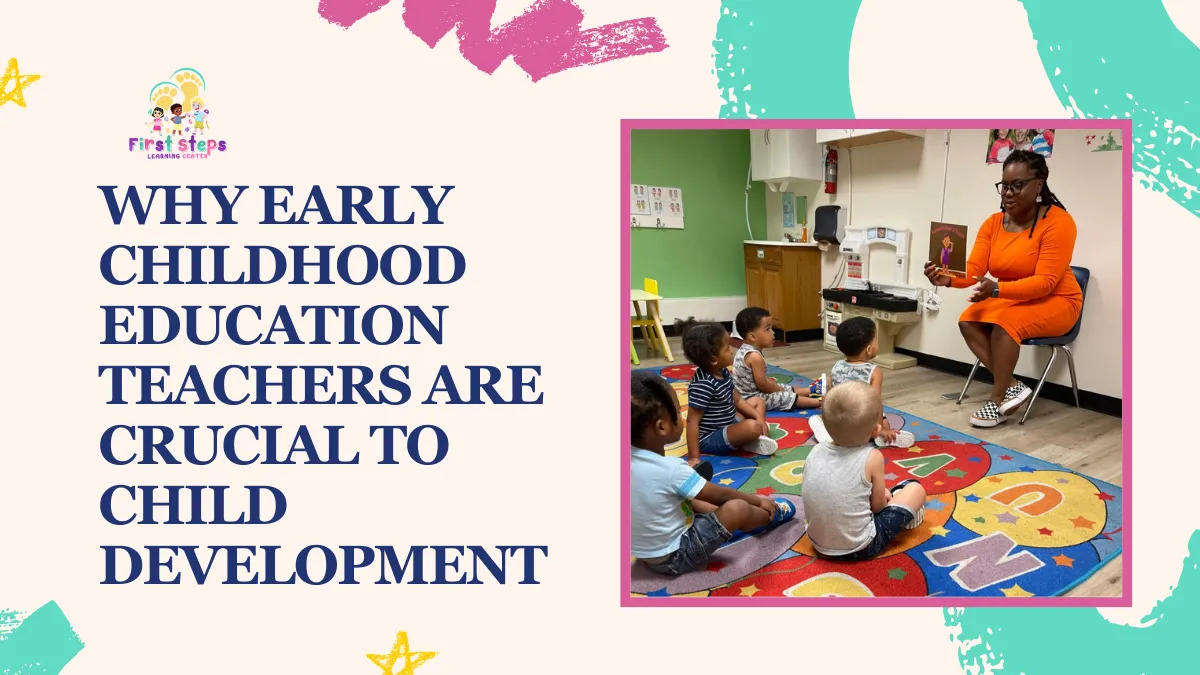Finding affordable daycare near me is a priority for many families seeking reliable early childhood education without exceeding their budget. With the rising childcare costs, locating a center that offers quality and affordability can be challenging. Fortunately, there are practical approaches parents can take to identify trusted options that align with their financial needs and educational expectations.
Families can secure a nurturing and developmentally appropriate environment for their children using the right strategies and resources. In this article, we will outline five proven ways to find affordable daycare options that support children’s growth while offering peace of mind to parents.
1. Research Low-Cost Childcare Options in Your Area
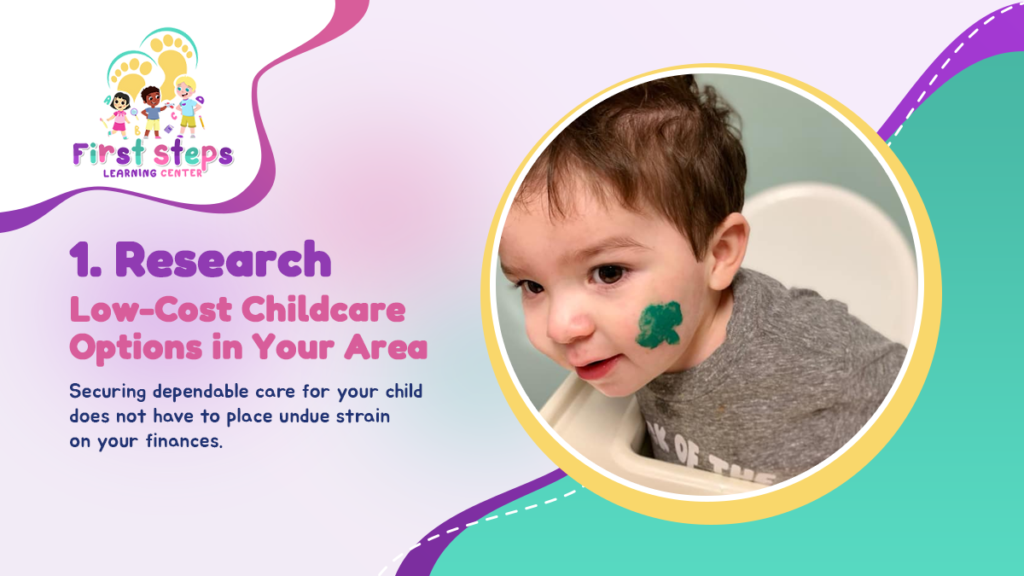
Securing dependable care for your child does not have to place undue strain on your finances. By researching low-cost childcare options in your area, families can access high-quality early education services that meet developmental and financial needs. Various resources exist to support families in finding affordable, licensed care.
Explore Government-Funded Programs
Government-funded programs are often the most reliable starting point for families in search of financial support. These initiatives are designed to provide subsidized childcare for eligible households based on income, employment status, and other qualifying factors. Common options include:
- Child Care and Development Fund (CCDF) – Delivers financial assistance for working families.
- Head Start and Early Head Start – Free programs focused on school readiness for low-income families with children from birth to age five.
- State and Local Subsidy Programs – Vary by region but often provide vouchers or direct subsidies for licensed childcare services.
Families should consult their state’s Department of Social Services or local child care resource and referral (CCR&R) agency to determine available programs and application requirements.
Contact Local Nonprofit Organizations
In many communities, nonprofit organizations actively support early childhood education through grants or subsidized care. These organizations may offer:
- Scholarships or sliding-scale tuition
- Emergency childcare support
- Access to community-based daycare services
Examples include local YMCAs, faith-based centers, or independent foundations focused on family services.
Utilize Employer or Educational Institution Resources
Some employers and colleges offer childcare benefits or on-site daycare services. These may include:
- Reimbursement accounts or childcare stipends
- Priority access to affiliated daycare centers
- Reduced tuition at partnered facilities
Families should contact their human resources department or student services office for support.
2. Compare Budget-Friendly Daycare Centers for Quality and Value
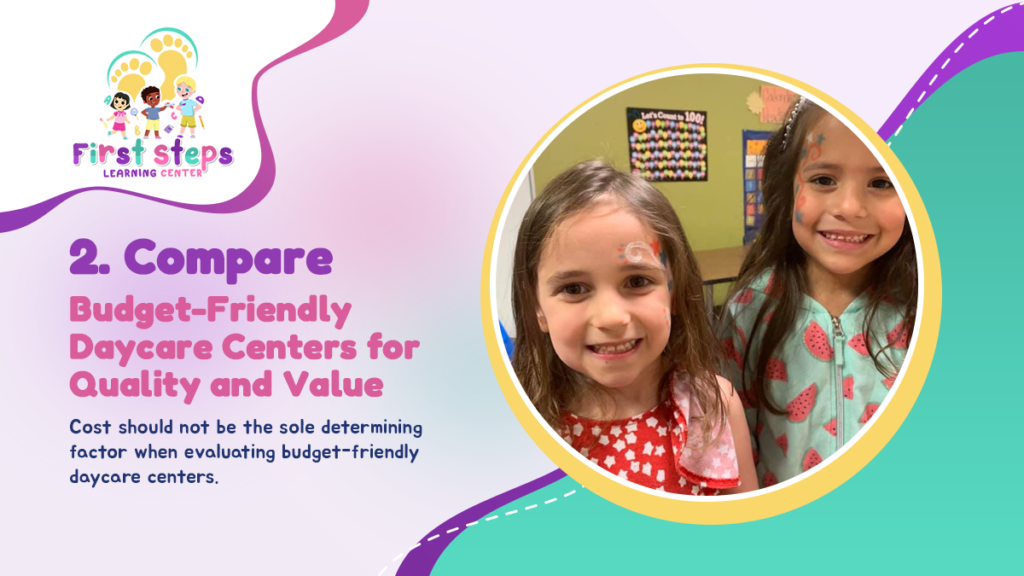
Cost should not be the sole determining factor when evaluating budget-friendly daycare centers. It is essential to assess the overall value offered by each center, including the quality of care, safety standards, staff credentials, and educational programming. A structured approach to comparing daycare options ensures families make informed decisions supporting their child’s development and financial needs.
Evaluate Licensing and Accreditation
Licensed daycare centers must meet specific state regulations related to health, safety, and staff-to-child ratios. Accreditation from national parties such as the National Association for the Education of Young Children (NAEYC) can also indicate high standards. When comparing centers, ask the following:
- Does the state license the center?
- Do any recognized organizations accredit it?
- How often is the facility inspected?
These factors help ensure that a center meets essential safety and operational benchmarks.
Assess Staff Qualifications and Child-to-Teacher Ratios
The experience and education of the staff strongly influence quality care. Families should inquire about:
- Staff certifications in early childhood education
- Ongoing professional development or training programs
- The ratio of caregivers to children in each age group
Smaller group sizes and qualified staff contribute to more individualized attention and a stronger learning environment.
Review Curriculum and Daily Structure
A well-designed curriculum supports cognitive, emotional, and social development. When touring daycare centers, request an overview of their learning philosophy and daily activities. Consider whether the curriculum:
- Is age-appropriate and developmentally aligned
- Encourages active play, literacy, and social interaction
- Incorporates meals, rest, and outdoor time
This ensures your child receives a well-rounded early education experience.
Visit Facilities and Ask Questions
In-person visits allow families to observe the learning environment, cleanliness, and staff interactions. During a tour, ask about:
- Safety procedures and emergency preparedness
- Communication policies with parents
- Availability of part-time or flexible schedules
By evaluating both affordability and overall program quality, families can select a budget-friendly daycare center that meets their expectations for care, education, and long-term value.
3. Enroll in Affordable Childcare Programs Through Local Agencies
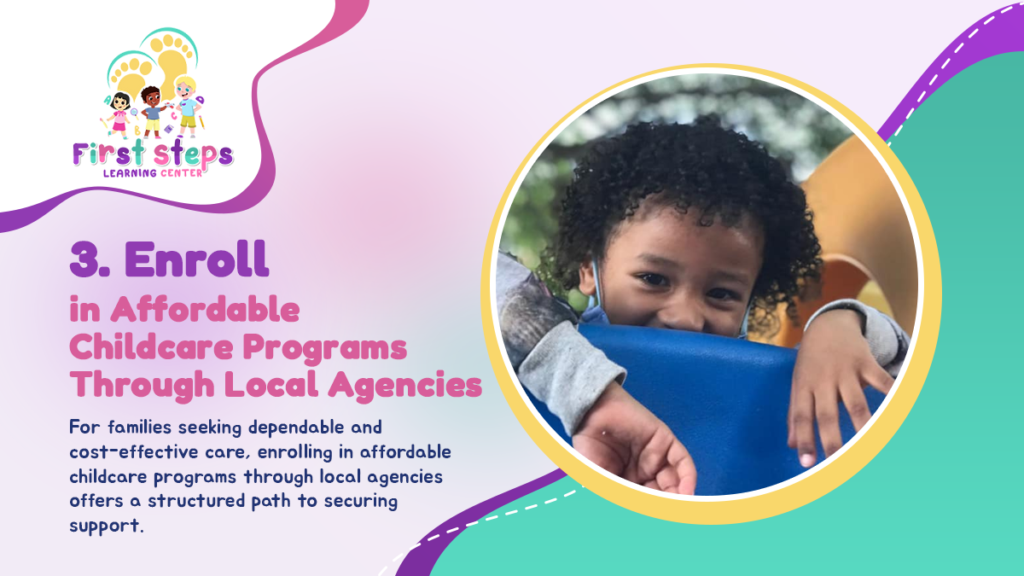
For families seeking dependable and cost-effective care, enrolling in affordable childcare programs through local agencies offers a structured path to securing support. These programs are often funded or managed by municipal, county, or state-level organizations and are designed to make early education more accessible to families with varying financial circumstances.
Identify Local Agencies and Childcare Networks
The first step is locating agencies in your area specializing in family services and early childhood education. Common sources of support include:
- Child Care Resource and Referral (CCR&R) Agencies – Provide listings of licensed childcare providers and guidance on applying for subsidies.
- Department of Social Services (DSS) – Administers financial assistance and placement in subsidized childcare programs.
- Local School Districts or Community Education Offices – May offer pre-kindergarten or early learning programs at reduced or no cost.
These agencies typically maintain updated directories of licensed providers and offer support throughout the application process.
Understand Program Types and Eligibility Requirements
Affordable childcare programs vary by location and funding source. Some of the most common types include:
- Subsidized Childcare Assistance – Reduces out-of-pocket expenses for qualifying families based on income, household size, and employment status.
- Early Childhood Education Grants – Offered through specific agencies or nonprofit organizations to cover part or all of tuition costs.
- Sliding Scale Programs – Adjust tuition rates according to the family’s financial situation.
Parents should gather documentation such as income statements, proof of employment or school enrollment, and residency verification to determine eligibility.
Complete the Application and Follow Up
Once a suitable program is identified, families should complete the required application forms through the appropriate agency. Key steps include:
- Submitting all required documents promptly
- Attending orientation or intake sessions (if applicable)
- Maintaining communication with caseworkers or program administrators
Enrollment in affordable childcare programs reduces financial burden and connects families to structured, developmentally appropriate learning environments. Local agencies serve as vital partners in supporting families through the early years of a child’s education.
4. Consider Home Daycare Providers as a Cost-Effective Alternative
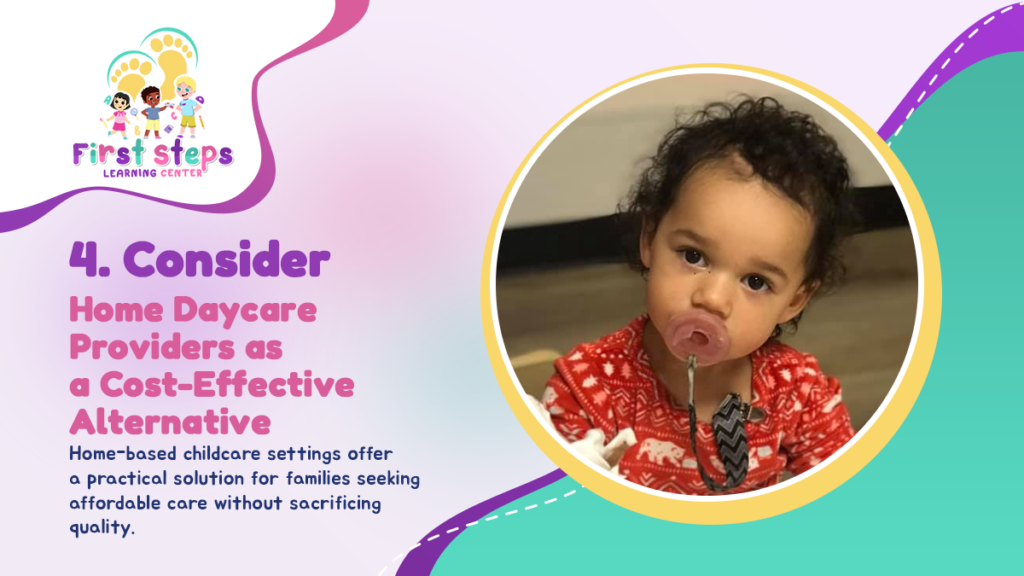
Home-based childcare settings offer a practical solution for families seeking affordable care without sacrificing quality. While larger centers may come with higher operating costs, licensed home daycare providers often maintain lower tuition rates due to smaller group sizes and reduced overhead. This type of setting combines personalized attention with budget-conscious pricing for many families.
Understand the Benefits of Home Daycare
Home daycare providers operate in residential environments and typically care for a limited number of children. Key advantages include:
- Lower Costs – Reduced facility and staffing expenses often translate to more affordable rates.
- Smaller Group Sizes – Fewer children per caregiver allow individualized care and closer supervision.
- Flexible Scheduling – Some providers offer part-time, evening, or weekend care to accommodate varying work hours.
These features make home daycare an appealing choice for families needing flexibility and affordability.
Verify Licensing and Safety Standards
Although more informal in settings, licensed home daycare providers are required to meet specific state regulations. When evaluating options, families should:
- Confirm state licensing and inspection history
- Ask about staff background checks and CPR/first aid certification
- Review emergency procedures, cleanliness, and safety protocols
A well-maintained home daycare should follow all health and safety guidelines similar to center-based care environments.
Evaluate Educational Activities and Structure
Many home daycare providers implement structured daily routines and age-appropriate learning activities despite the smaller scale. Parents should inquire about:
- The provider’s approach to early childhood development
- Types of activities offered (e.g., reading time, arts and crafts, outdoor play)
- Daily schedules that include meals, rest periods, and free play
This helps ensure the setting supports the child’s academic and social growth.
Schedule a Visit and Check the References
Before making a final decision, families should visit the home daycare, observe interactions, and speak with the provider. It is also essential to:
- Request references from current or past families
- Review parent testimonials or ratings (if available)
- Clarify policies on illness, discipline, and communication
Home daycare providers can offer a nurturing, cost-effective childcare experience when selected with careful consideration and due diligence.
5. Use Online Platforms and Referral Networks to Find Hidden Opportunities
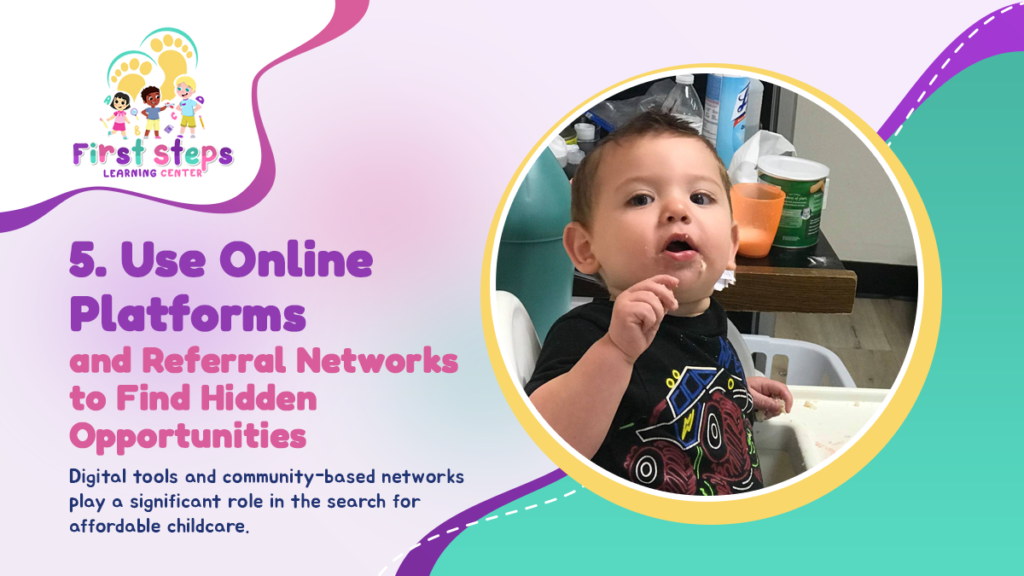
Digital tools and community-based networks play a significant role in the search for affordable childcare. Parents can access a wide range of daycare options through trusted online platforms and referral services, often uncovering chances that may not be widely advertised. Utilizing these resources allows families to filter results based on location, pricing, availability, and quality, making the process more efficient and informed.
Search Childcare Databases and Listing Websites
Several online platforms are dedicated to helping families find licensed daycare providers. These websites often include detailed profiles, pricing information, and parent reviews. Common platforms include:
- Care.com
- Winnie
- ChildCare.gov
- Local Child Care Resource & Referral (CCR&R) websites
By applying filters such as cost range, age group, and type of care, families can narrow their options and focus on centers that align with their budget and preferences.
Use Referral Services from Community Organizations
Many community-based organizations maintain referral services that guide parents toward reputable and affordable daycare providers. These services often provide:
- Personalized assistance in identifying suitable childcare options
- Access to waitlist openings and enrollment support
- Information on financial aid or subsidy eligibility
Organizations such as local family service agencies, school districts, and nonprofit childcare councils are valuable sources of trusted referrals.
Leverage Parenting Forums and Social Media Groups
Online parenting forums and local social media communities can offer first-hand recommendations from other families. These informal networks often share the following:
- Honest reviews of local daycare providers
- Information about new openings or promotions
- Insights into lesser-known but high-quality home daycare providers
Examples include neighborhood Facebook groups, community-based parenting blogs, and regional family-focused websites.
Confirm Credentials and Conduct Follow-Up
While online platforms provide convenience, it is essential to verify all details independently. Once a promising option is found:
- Schedule a visit or virtual tour
- Confirm licensing and accreditation
- Request references and review contracts or policies
By combining digital resources with personal outreach, families can uncover quality childcare options that may otherwise go unnoticed—ensuring access to affordable, safe, and developmentally appropriate care.
Conclusion
Finding affordable daycare near me is not only possible—it’s entirely achievable with the right approach. From exploring low-cost childcare programs and comparing budget-friendly centers to considering home-based care and leveraging online tools, families have many strategies at their disposal. With thoughtful planning and access to trusted resources, parents can confidently select a childcare solution that supports their child’s development while remaining within budget. Every child deserves a safe, nurturing, and educational environment—and every family deserves the peace of mind that comes with making the right choice.
Ready to take the next step? Contact First Steps Learning Center at 281-392-9194 to learn more about our programs and availability. Your child’s journey begins here.


